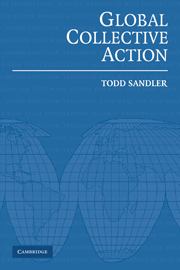Book contents
- Frontmatter
- Contents
- Tables and Figures
- Preface
- 1 Future Perfect
- 2 “With a Little Help from My Friends”: Principles of Collective Action
- 3 Absence of Invisibility: Market Failures
- 4 Transnational Public Goods: Financing and Institutions
- 5 Global Health
- 6 What to Try Next? Foreign Aid Quagmire
- 7 Rogues and Bandits: Who Bells the Cat?
- 8 Terrorism: 9/11 and Its Aftermath
- 9 Citizen against Citizen
- 10 Tales of Two Collectives: Atmospheric Pollution
- 11 The Final Frontier
- 12 Future Conditional
- References
- Author Index
- Subject Index
4 - Transnational Public Goods: Financing and Institutions
Published online by Cambridge University Press: 19 January 2010
- Frontmatter
- Contents
- Tables and Figures
- Preface
- 1 Future Perfect
- 2 “With a Little Help from My Friends”: Principles of Collective Action
- 3 Absence of Invisibility: Market Failures
- 4 Transnational Public Goods: Financing and Institutions
- 5 Global Health
- 6 What to Try Next? Foreign Aid Quagmire
- 7 Rogues and Bandits: Who Bells the Cat?
- 8 Terrorism: 9/11 and Its Aftermath
- 9 Citizen against Citizen
- 10 Tales of Two Collectives: Atmospheric Pollution
- 11 The Final Frontier
- 12 Future Conditional
- References
- Author Index
- Subject Index
Summary
In 1976, I submitted a paper on transnational public goods (TPGs) to a top economics journal. This paper investigated the growing collective action difficulties posed by such goods and used examples that included transfrontier pollution, transnational terrorism, infectious diseases, satellite networks, and a Chunnel linking France and the United Kingdom. I was especially interested in how novel institutional and financial arrangements were slowly evolving to address these TPG contingencies. Although the paper went successfully through two rounds of refereeing, the extremely favorable recommendations of the referees were dismissed as “patronizing” by the editor, who said that such an established journal should not be publishing “avant-garde science fiction” articles. For the first and last time in my life, the term avant-garde was applied to me or my work. That paper, which never saw the light of day in its original form, spawned a whole research agenda for me during two decades. Fortunately, I have lived long enough to see that everything in that paper was spot on. With new books appearing yearly, there is no question that interest in TPGs is here to stay.
Why have TPGs grown in importance so that they now interest even the gatekeepers of the exalted journals, where academics turn to discover acceptable research topics? First, and foremost, the current fixation on globalization has underscored the importance of TPGs. Globalization emphasizes cross-border flows of all kinds including the spillovers of benefits and costs associated with TPGs and transnational externalities.
- Type
- Chapter
- Information
- Global Collective Action , pp. 75 - 98Publisher: Cambridge University PressPrint publication year: 2004



